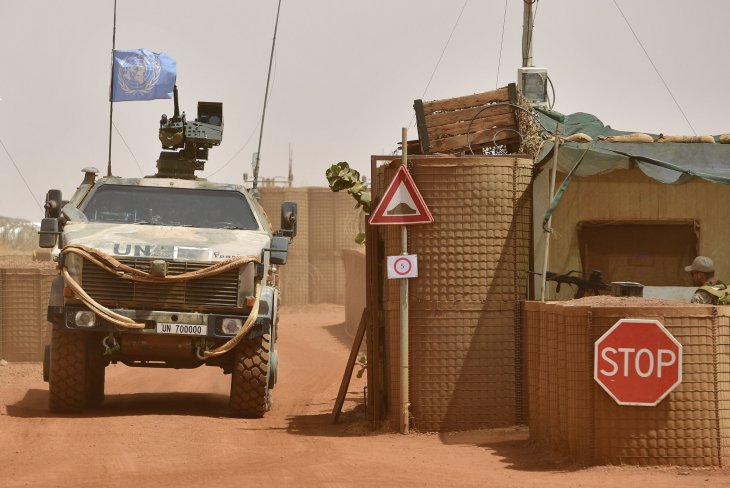On 30 June, the UN Security Council had been expected to extend the mandate of the UN’s mission in Mali (MINUSMA) for a further year. On 16 June, however, the Malian foreign minister asked the UN to withdraw from the country.

A Dingo tank of the Bundeswehr, the German armed forces, enters Camp Castor after returning from a trainings mission on March 6, 2017 in Gao, Mali as part of the U.N.-led MINUSMA.(Photo: Alexander Koerner/Getty Images)
Instead of extending the UN’s mission, the Security Council’s members, headed by France, had to scramble to draft a withdrawal resolution. The withdrawal of the 13,000 soldiers who make up the UN force will be completed by the end of this year.
Norway has made several contributions to MINUSMA since 2013, including three air transport contributions and operation of the Norwegian camp Bifrost, just outside the capital Bamako. But now the mission is over for Norway and the other UN member states that have contributed to the UN’s operations in Mali.
Why was the UN asked to leave?
In recent years, the relationship between the Malian government and the international community has gone rapidly downhill. Two military coups took place in 2020 and 2021, resulting in a transitional military government. The military regime has more or less broken diplomatic links with the former colonial power France and has thrown out Operation Barkhane, the French counterterrorism campaign. The regime has also withdrawn from G5 Sahel, a regional counterterrorism initiative, and triggered a number of diplomatic conflicts with parties including its neighbour Ivory Coast and the Economic Community of West African States (ECOWAS).
The Malian regime has seen its interests well served by painting an outwardly hostile picture of the West and its allies as the cause of many of Mali’s problems, and there has been an increase in anti-Western demonstrations in the major cities. Tensions have also been increasing between Mali and the UN. In the past year, the Malian regime has repeatedly imposed restrictions on MINUSMA’s ability to conduct operations on Malian territory and has protested vociferously when MINUSMA has reported human rights breaches committed by Malian troops and their partner organizations. As a result, several Western countries had already withdrawn, or were planning to withdraw, their contributions to MINUSMA.
The role of the Wagner Group in Mali
Apropos partner organizations. At the end of 2021, a new actor joined the Malian conflict, namely the Wagner Group. The group is now well known as a key player in the war in Ukraine, but many people are probably less aware of the group’s role in several African conflicts. The Wagner Group is present in Mali and, among other things, conducts so-called counterterrorism operations in partnership with the Malian army.
A vulnerable civilian population
It is the civilian population that is suffering the harshest consequences of the conflict and that will most likely notice MINUSMA’s withdrawal the most. Statistics from ACLED show that violence against civilians is increasing in the region. A UN report published in May this year accused Malian forces and “foreign soldiers” (viz. the Wagner Group) of massacring 300 civilians in the rural town of Moura in March 2022. The report provoked strong reactions from the Malian regime, which characterized the report as a pure fiction. Reporting human rights breaches is a central part of the UN’s work and will become more difficult once MINUSMA is disbanded.
What happens now? The post-MINUSMA situation
Mali’s future is uncertain, and many people fear the worst. The humanitarian situation is already precarious, with large numbers of internally displaced persons, and food security is a major concern. It is unclear what will happen once MINUSMA is disbanded, but there is general agreement that the departed UN troops will leave a security vacuum in their wake. Whether the Wagner Group’s mercenaries fill this void remains to be seen.
There is great anxiety about the future of the peace process that was initiated in 2015. One of MINUSMA’s primary tasks has been to support and facilitate the peace process. The process has long been under pressure due to lack of trust between the parties, but now many fear that the regime in Bamako will see a chance to rid itself of an agreement it never really wanted, and set its sights on a military victory in the north.
Perhaps the time has come for more local solutions? An important step would be for the parties to engage in reestablishing dialogue. A completely local solution is unlikely to be what the Malian regime has in mind, however. Until recently, no one has been willing to admit that the Wagner Group is operating in Mali, yet the Russian government has become an increasingly important partner, including militarily. Turkey has also emerged as an important backer of the Malian regime.
These recent events are also focusing attention on the future of the UN’s peace operations generally. Despite the efforts of the international community, the security situation in large parts of Mali is now worse than it was 10 years ago, and 306 UN peacekeepers have lost their lives in Mali. The chapter will soon close on the UN’s deadliest and most expensive peacekeeping mission to date.
- Jenny Lorentzen is a Postdoctoral Fellow at the Department of Political Science, Lund University, and a Senior researcher at the Peace Research Institute Oslo (PRIO).
- This text was first published on Klassekampen on 13 July 2023 (in Norwegian).